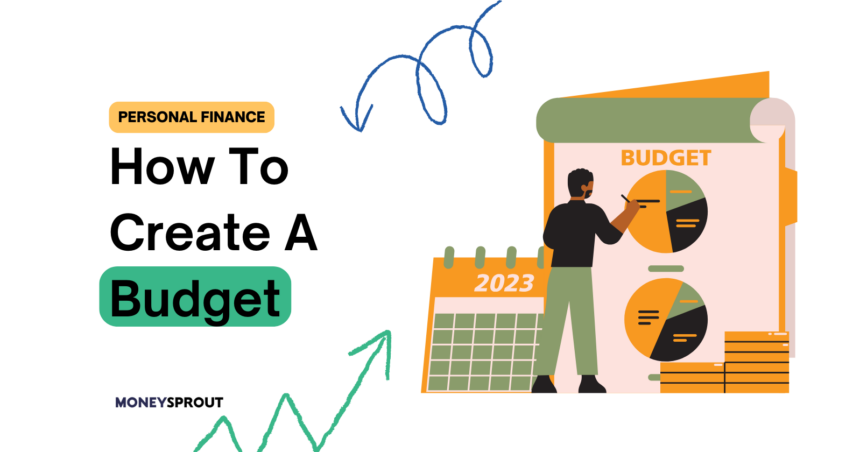More than ever finances seem to be getting squeezed tighter and tighter. Every time I walk into the shop it seems like something has gone up 50% in price. For many households, their money isn’t going as far as it used to. This may mean you need to start strictly following a budget to get your finances in order.
Over the past 5 years, I have been able to build my stock portfolio to over £90,000 at 26 years old by following a strict budgeting process. In this article, I am going to show you the steps I go through to build a sustainable budget. A budget, that allows me to invest for the future while still enjoying life. Let’s get into it.
What Is A Budget?
A budget is a financial planning tool that analyses how much you earn (income) and how much you spend (outgoings) over a specific period of time, usually a month or year. By using a budget you can create a financial plan that allows you to prioritise where you spend your money each month.
When you know where your money is going each month, you can plan ahead and work towards your financial goals. By reviewing your spending regularly you can keep track of your spending and be intentional about where your is being spent.
Many people simply get their paycheck and spend until it runs out, then start to live frugally towards the end of the month. Even worse, they continue spending via debt and get themself into even more financial trouble. Budgeting helps to avoid these problems before they happen and also helps to get you out of debt if you’re currently in it.
Why Should You Budget?
No matter where you are in your financial life, budgeting can help you hit your goals. A budget is the foundation of a successful financial future. Putting a budget in place is your financial plumbing. We use pipes to help water flow to the correct places in our house. Your budget is your financial “pipes”, directing your money to the places it should be going. Without the pipes, the water would go everywhere, the same applies to your money.
While a budget is great to have in place for anyone, let’s take a look at a few specific situations where it could help you.
- Controls Overspending – You may be overspending in a category and not even realise it. A budget allows you to come face to face with the amount of money you’re spending on certain categories.
- Helps You Reach Financial Goals – If you’re saving for a house, retirement or even just a holiday having a budget provides you with a roadmap towards these goals. It lays out a clear time frame on how long it will take you to get there.
- Intentional Spending – With a budget you tend to assign categories to the money you bring in. If you create a budget you are comfortable with and assign leftover money to savings and investing you’re much less likely to spend that money on something you didn’t really want or need. If you have money sitting around that doesn’t have a goal, you usually spend it on something you don’t need, just because you can.
- Reduces Financial Stress – Finances are a huge source of stress however if you know you are spending less money than you make, it’s much easier to sleep at night. A budget allows you to start building an emergency fund that protects you financially from unexpected events such as a car breaking down or getting laid off.
- Helps Reduce Debt – If you are struggling with debt, having a budget is an essential tool to get it paid off as soon as possible. Figuring out where your money is going and cutting back on unnecessary spending can help you pay your debt down quickly.
Tips Before Creating Your Budget
Before starting to create your budget, there are a few things to keep in mind:
- Timeframe – If most of your bills come out monthly and you get paid monthly, you should calculate your budget on a monthly basis
- Have Everything You Need – If you have multiple debit cards, credit cards etc ensure you have statements for all of them. If money is being spent it should be included in the budget. Using your actual statements gives you accurate numbers to work with rather than making estimates.
- Be Accurate – If you have to estimate some bills that are variable, estimate on the high end rather than the low end. Any fixed bills should be 100% accurate in your budget.
- Involve Your Partner – If you live in a house with a partner or family, it’s much easier to do a budget together and ensure that your goals align. Calculate your total household income and total household expenses when working your budget.
Where Should I Write My Budget?
You create a budget by simply writing down your income and expenses on a piece of paper or you can use a fancy app such as Moneyhub or Money Dashboard.
Personally, I like to go in between and use an Excel spreadsheet. This allows me to track my spending month to month and have a record of historical data. It allows me to have more customisation of my budget than an app.
If you want a Google Sheet budget template, check out our 50/30/20 budget planner.
- Monthly Budget Overview
- Custom Categories
- Transaction Log
- View Daily Spending Overview
- Track Needs, Wants, Savings/Investments & Debts
The apps are great as they connect directly to your bank account and pull in your transactions and automatically categorise them on a daily basis. If you want to see a live update of your budget on a daily basis, this is a great option.
However, with all this said, sometimes it’s just as easy to pull out a pen and paper and start going through your statements manually.
50/30/20 Budget
You may have heard of the 50/30/20 budgeting rule. It’s a basic framework for budgeting that is a great starting place for most people. 50/30/20 breaks down your post-tax salary into three categories; Needs (50%), Wants (30%) and Savings (20%).
50/30/20 Budget Calculator
To calculate how much should be spent on each of the three categories, simply enter your post-tax income and any extra income you receive in the boxes below.
The 50/30/20 rule is a good place to start but some people may need to adjust it to suit their own personal circumstances.
For example, if you are trying to pay off crippling credit card debt, your wants category probably shouldn’t be 30%. You should try and cut back the wants category to 5 or 10% and allocate the remainder to paying down debt until it is paid off.
You may also be following a Financially Independant Retire Early plan which would require you to have a certain amount invested for you to retire. If this is your priority, you may choose to live frugally and dedicate a large portion of your income towards savings and investing.
It really depends on your own financial situation. Once you outline your budget for the first time you will be able to see how your categories look and can adjust from there.
50/30/30 Budget Categories Breakdown
The 3 categories of this budgeting method are broken down into Needs, Wants and Saving however what do each of these categories actually include? Let’s take a look at how you can break it down.
Needs
Needs are necessities that you cannot live without. It should take up no more than 50% of your post-tax income. This includes:
- Housing – Rent or Mortgage Payments
- Utility Bills – Electric, water, Internet, Phone, Rates/Council Tax
- Groceries – Essential food items (Does not include eating out)
- Car Payments or Transportation (Car payments should be reasonable and fit within this category)
- Child Care
- Healthcare
- Minimum Debt Repayments (Anything above the minimum should be included in your savings and debt repayments category)
Wants
The “Wants” category consists of expenses that are considered non-essential. T
- Eating out at restaurants or cafes
- Takeaways
- Nights out
- Subscriptions (Spotify, Netflix, Sky TV etc)
- New clothes that aren’t needed (Especially designer clothes)
- Holidays and weekend breaks
- Hobbies
You may find when you do your initial budget, you are spending a lot more than 30% on wants and dedicating nothing towards your savings. When working through your expenses you should figure out what you can cut back on to reduce expenditure in this section.
Savings & Debt Repayments
The savings section is dedicated to saving towards your emergency fund and large life goals. This includes retirement, weddings, home deposit and more.
- Emergency Fund
- Savings
- Investing
How To Do A Budget Step By Step
Now we have outlined what a budget is and how you can categorise your expenses using the 50/30/20 rule, it’s time to get started working through it.
Step 1 – Gather All Of The Information You Need
The first step is gathering all of the information you need. The easiest way to do this is to download all of the bank statements from the accounts you spend money on. Here you will be able to see your income and outgoings on a monthly basis.
You may also want to find any loan or credit accounts you have to find your minimum payments and interest rates.
Step 2 – Calculate Your Income
First, we can calculate your income. For most people this will be your income from your job. However, some people may also have income from side hustles, investments, etc. When calculating income from these side jobs, estimate on the low side if you know the income from them can change from month to month. The same applies if you run a business and have a different income every month. Try to estimate an average monthly income you can get reliably each month.
Step 3 – Calculate & Categorize Your Expenses
Now we need to go through each expense we have and categorise it in the expenses side of our budget. You can stick with Needs, Wants and Savings as your main categories and then break it down further in each of these categories. For example, you could categorise it like this:
Needs
- Housing
- Utilities
- Groceries
- Transport
- Essential Clothes
Wants
- Eating out & Takeaway
- Entertainment
- Health & Fitness
- Clothing
Savings
- Investments
- Wedding Savings
Everyone lives a different lifestyle, so this will need to be adjusted for you specifically.
Go through your bank statements one by one categorising each of the expenses and adding it to that category in your budget.
You will end up with a breakdown of how much you are spending in each category in your life.
Step 4 – Compare Your Income To Expenses
You will now have a good idea of where you stand in terms of income vs expenses. If your expenses exceed your income, it’s time to make some drastic changes. If you’re saving 20% of your income each month and your income exceeds your expenses, you’re in a great position and can start making some decisions on how you want to spend your money.
Step 5 – Identify Areas Where You Can Save & Cut Back
Now you have categorised all of your expenses you should start to see trends in your spending.
Maybe you never realised how much you spent on eating out or going to bars on the weekend. This is an easy category to cut back on. Simply cook at home and take a packed lunch. Rather than going out 3 nights a month to the bars, go out one.
You may find that you have 6 subscriptions or direct debits that you never use. Instantly cancel those. £12 a month for a streaming or music service may not seem like a lot but that’s £144/year. If you can find 6 items like that on your list you save over £864 per year. That’s a significant amount of money on things you weren’t even using.
Do you regularly buy designer clothes that you really don’t need? Cut this out and you might save hundreds of pounds per month.
I go through this process every 3 months and always find that new items have crept in. I realised I was spending a ridiculous amount of money going to bars on the weekends. I would spend £100 out, £30 on a taxi home, £20 on dominoes, and then die on the sofa the next day and order more takeaway. That’s £600 a month going on mediocre nights out. I’ve now tried to cut that back to once a month and it saves me a huge amount of money.
Everyone’s different. I’m young with no kids, so your money may be going somewhere completely different than mine. Find your “leak in your finances” and plug it.
Step 6 – Create Your Final Budget
Now we have identified where your money is going, it’s time to draw up a final budget. We want to set a reasonable amount of money for each of the categories on the budget.
Start with any “Need” payments like housing, car payments, and insurance payments as they will not change in the short term.
Next move on to your 20% savings & debt repayments. If you have debts to get paid this should eat well into your wants category until it is paid off. If you don’t have any debts (excluding house and car payments) you can start funneling 20% of your money into savings and investments.
Then move on to your variable costs. This is where you need to decide where to cut back. Set a limit on how much you’re going to spend on eating out, entertainment, clothes, holidays etc. This should be made up of roughly 30% of your total budget. If it’s over, you need to find a way to cut back. If it’s under, you can start contributing more to paying off debt or investing.
Step 7 – Monitor Your Budget
Lastly, you need to monitor your budget over time. You can add your expenses to your budget weekly so you can see how you are matching up with certain categories. If you’re three weeks into the month and you’ve spent all of your entertainment budget, you should sit in the last week of the month.
Your budget will not be perfect the first time you do this. You will likely have some categories over-allocated and some under-allocated. The longer you use your budget, the more accurate you will get with your categories.
Each month sit down for 1 to 2 hours and go through your budget and plan for the next month.
What Should I Do When My Expenses Exceed My Income?
If your expenses exceed your income, there are two things you can do. You can either make more or reduce your expenses. For most, the best thing to do is to cut your expenses in the short term and try to increase your income in the long term.
If you need to cut expenses fast, this is the strategy I would follow:
- Print all of your bank and credit card statements out and get a highlighter. Ruthlessly go through line by line and see where you can cut expenses. Start by canceling any unnecessary subscriptions. Do you really need Netflix, Prime and Now TV? Probably not. Then go through things that you can substitute for a cheaper alternative. Eating out? Make your own food. Going to bars? Have a party in the house. Buying designer clothes? Wear the clothes you already own. There are always ways to cut down.
- Find any direct debits you have and see if you can get a lower price. With insurance, sky tv, broadband etc you can usually get a cheaper price by contacting them or switching to another provider.
- Replace necessities with cheaper alternatives. Food is a great place to replace name brands with cheaper alternatives that taste 90% as good and are 50% as cheap.
These are some of the best ways to quickly cut back on your expenses. We have another article on How to save £10k in a year which I would also recommend reading.
How Often Should You Review And Adjust A Budget
We recommend looking over your budget and updating it with your transactions once per week. Doing this will allow you to adjust your spending in the weeks ahead to keep you on track for the month. At the end of the month, you should do a full overview of your monthly spending and make any adjustments you need to for the month ahead.
What To Do With Your Excess Money
If you have excess money at the end of the month you’re in a great position. If you are already saving 20% per month towards investments (retirement) and you have an emergency fund in place you can do as you please with your excess money.
If you want to become financially free your goal should be building a large investment portfolio that can eventually replace your income. You can do this by consistently investing your excess money into an index fund each month that grows over time.
You can use our Compound interest calculator to see how much your monthly deposits will be worth over time.
Final Thoughts
You should now be able to create your very own budget and hopefully get better control over your finances. It’s important to be disciplined with the budget you create and actually stick to it. If you do, your financial life can change for the better and you can get on the path to financial freedom.
Read More From Money Sprout:




